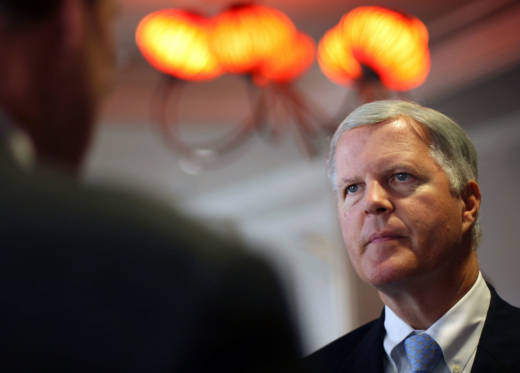Under California law, a new political party can get on the ballot in one of two ways. One option is to gather roughly 700,000 signatures.
But there’s an alternative, which Campbell characterizes as the easier way: convince a little over 60,000 already registered voters to either go online or contact their county registrar and switch their registration to the new, still unnamed, party. With the right targeted email pitch, it could be pulled off under $100,000, he said. Revolutionize the state political system for less than a legislator’s annual salary.
Who might want to join the new party? Prospects abound.
Take the 4.9 million voters who identify with no political group at all, but simply register with “no party preference.” There are now more of those noncommitted voters than registered Republicans. Campbell would need to convince only 1 percent to join him.
And a half-million Californians are registered with the American Independent Party — despite the fact that an L.A. Times survey from two years ago found that a majority of them believe that makes them politically unaffiliated, not members of a party founded by segregationist George Wallace. Which they are.
“If we reached 83,000 of them, three-quarters would realize they had mis-registered, and might join the Center Party,” said Campbell.
Or if not the “Center Party,” then maybe the “Bear Flag Party.” He and his group of like-minded political independents — former independent state Sen. Quentin Kopp of San Francisco among them — have yet to settle on a name.
They haven’t settled on a platform either. One possible approach would be to provide an ideological home for disaffected Republicans and other wayward centrists — people like Campbell, who publicly ditched the GOP when it embraced Donald Trump.
But Campbell said he can also imagine creating a platform-free organization that would simply let candidates run untethered from any major party.
Such candidates are currently barred from labeling themselves “independents,” since voters might confuse the term with Wallace’s old party. Instead, they have to use to the cumbersome “no party preference.” Steve Poizner, a former Republican himself, has adopted that identifier in his run for state insurance commissioner.
But the “NPP” brand, to Campbell, implies apathy or indecisiveness.
“No Party Preference is a pejorative,” he said. A new party—even one with no ideological platform whatsoever—would allow a candidate to run outside the current party structure, “but without the scarlet letter of NPP,” he said.
According to a recent poll by the bipartisan Democracy Fund Voter Study Group, two-thirds of Americans would welcome a third electoral choice. There was much less agreement over what this new party ought to actually stand for, with respondents split between the far left, far right, and the center.
“I think there are a whole number of logistical challenges to create a third party,” said Democratic Assemblyman Adam Gray from Merced. As former leader of the Assembly’s “mod caucus,” he regularly departs from his party on environmental issues, gun control and business regulation. He champions more moderation in state politics, but said it’s easier to do that through the existing parties:
“Maybe the silent majority of moderate Republicans and Democrats ought to take back our own parties from the fringe.”
CALmatters.org is a nonprofit, nonpartisan media venture explaining California policies and politics.
